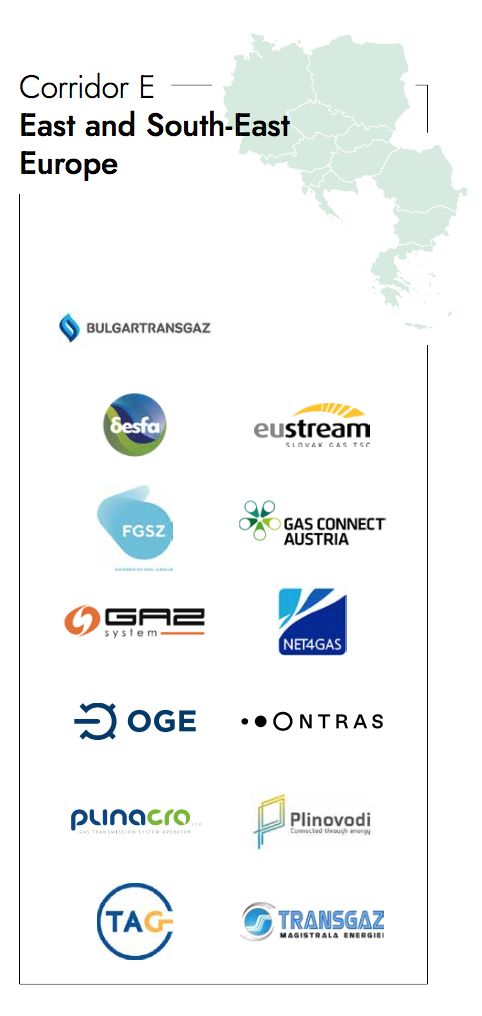Following the decision of the European Union to increase its already ambitious hydrogen targets up to 20 million tonnes (mt) by 2030, Greece has emerged as a potential regional hydrogen hub. Indeed, the country is part of the so-called Corridor E, identified by the European Hydrogen Backbone (EHB) initiative to connect high-supply potential regions, leveraging vast land availability and high-capacity factors for solar and wind, with off-takers in Central Europe and Germany.
Greece’s natural gas transmission system operator DESFA will play a crucial role in shaping the country’s hydrogen economy, following a series of deals, agreements and memoranda signed with different entities to design a functioning hydrogen market. In the words of the Minister of Development and Investments, Adonis Georgiadis, it is time for Greece to not be the last one but the pioneer. Indeed, for the government and interested businesses, this is no longer a theoretical debate but a process that has already started and that will soon bring tangible results by accelerating the green transition.
However, Constantinos Papalucas, Coordinator of the National Hydrogen Committee at the Ministry of the Environment and Energy notes that like the other European Member States and other countries of the developed world, Greece is still in the very early stages of the initiation of the hydrogen economy and many steps still need to be taken.
Greece’s hydrogen potential and the projects that will bring to the surface the core issues for the regulators
According to the country’s National Hydrogen Strategy, the development of the national hydrogen economy is separated into three distinct phases.
“The initiation of the market (2022-2027), the emergence of the hydrogen market (2025-2030) and finally the market development/market maturity phase (2027-2035),” Mr Papalucas explains. “At this point, the market is facing uncertainties, high costs and inadequate infrastructure that discourage private investment. That’s why the main goal of the State Aid granting scheme is the materialisation of some first pilot projects/applications and the creation of the first critical infrastructure by supporting the project promoters to deal with the market failures associated risks.”
“The ultimate goal is the reduction of cost and the safeguarding of the operational framework from the uncertainties,” he tells CEENERGYNEWS. “Those are the projects that will bring to the surface the core issues that have to be dealt with by the regulators.”
Indeed, Greece has just notified the H2CEM project which is the third project participating in the Important Projects of Common European Interest (IPCEI), related to the decarbonisation of its cement industry via hydrogen.
“This is the second IPCEI wave also known as Hy2Use,” underlines Mr Papalucas. “We have already notified two projects in the first wave of H2Tech: GreenHippo which is an innovative production facility of electrolysers and fuel cells in Western Macedonia and H2Tank which is related to tailor-made innovative tanks made out of carbon fibre and optic fibre H2 leakage sensors that both can be used either in transportation or storage of hydrogen.”
He goes on by mentioning a good lineup of projects that will participate in the next IPCEI waves, the Climate, Environmental Protection and Energy Aid Guidelines (known as CEEAG) and the General Block Exemption Regulation (GBER) State aid.
“I believe that these projects will create the necessary critical mass to see our national hydrogen economy emerging,” he says.

Also Daniel Muthmann, Chair of the European Hydrogen Backbone initiative believes that Greece is part of the dynamic development around hydrogen which we are currently seeing in Europe.
“The country has enormous production potential for green hydrogen given its wind and solar potential,” Mr Muthmann tells CEENERGYNEWS. “Projects are being developed and infrastructure players (in particular our partner in the EHB initiative DESFA) are in the process of mapping out future hydrogen infrastructure to connect sources and sinks of hydrogen and future interconnection points with neighbouring countries.”
Overcoming chicken-and-egg-situations
Together with the opportunities, Greece also shares similar challenges as other European countries interested in developing a hydrogen economy.
Mr Muthmann mentions that a whole value chain needs to be developed to produce a clean and competitively priced product for future customers in various sectors.
“It is challenging to find ways to incentivise the use of hydrogen because it all starts with the customers and initial investments need to be financially supported,” he states. “Secondly, green hydrogen has to be produced in regions where land availability and solar and wind conditions are favourable. That is mostly not where demand is located.”
“So gas infrastructure becomes instrumental to actually allow supply and demand to meet and hence for the scale-up of hydrogen to reach cost competitiveness. In order to overcome chicken-and-egg-situations, solutions need to be found to set up an initial start grid for hydrogen, which can luckily often be achieved by re-purposing existing gas infrastructure.”
For the Coordinator of the National Hydrogen Committee, Greece’s hard-to-abate sectors could benefit the most.
“In this emerging global hydrogen economy, there is a role of our shipping community as the up streamers around the globe have to connect themselves to the demand centres of the world,” Mr Papalucas says, comparing the situation to the LNG market. “The same case goes with CO2 transportation. There are some confirmed reports that a Greek shipping company currently explores the scenario to build 60 CO2 carriers.”
In addition, by 2030 he expects to see a further penetration of hydrogen in the refineries, but also in other segments of Greece’s hard-to-abate industries, although not that big compared to other industrial European countries.
“Also, hydrogen will play a role through the synthetic fuels in the transportation sector (trucks, buses and trains) and the short-distance maritime sector (ferries),” he adds.
“Finally, apart from the emerging hydrogen valley in Western Macedonia, I also expect to see the emergence of several hydrogen islands especially the ones that have the appropriate size and will not be interconnected with the mainland.”
Greece: not only the forerunner of the emergence of an Eastern Mediterranean hydrogen hub
With Greece being included in the EHB’s Corridor E, the country becomes even more well positioned to be a net exporter of green hydrogen.
“Also it fills a transit function for neighbouring countries providing additional hydrogen supplies all the way down to the Middle East, in the mid-to longer term,” highlights Mr Muthmann.
The companies DESFA and DEPA are both actively involved in the process, especially in preparing the current infrastructure to be hydrogen-ready.
“What Greece should do while waiting is not only to act as the forerunner of the emergence of an Eastern Mediterranean hydrogen hub but also to work in advance with the countries of the region to lay down the grounds of the necessary infrastructure to connect the Corridor E with the MENA region,” points out Mr Papalucas. “This includes hydrogen-ready pipeline studies, ammonia and methanol infrastructure, hydrogen-ready FSRUs, a regional CCUS infrastructure and many others.”
In the meantime, the government keeps working in this direction and, as explained by Constantinos Papalucas, this cross-sectoral approach applied is something that the Greek government can take pride in, as it laid the cornerstone for the organic emergence of a Greek national hydrogen economy.
“More specifically,” he continues, “we created early on a joint platform where the Secretaries of Energy with the Secretaries of Industry, Maritime Affairs, Transportation, Research and Innovation and lately the one of Agricultural Development interacted with each other, first to create awareness and then to create a parallel bottom-up channel to bring all sectors that can participate in our emerging hydrogen economy in the process.”
Regarding the goals, the numbers that are provided within the hydrogen strategy for the electrolyser capacity are in full accordance and proportional to what the European Commission has set as a goal per Member State. Greece expects that 2035 will be the milestone year.
“Therefore the decade of 2030-2040 will be the most crucial,” concludes Mr Papalucas. “What is also of utter importance is to highlight that hydrogen would also dominate on energy storage because of its nature, therefore, leveraging further utilisation of our renewable energy potential and the further development of renewables in the Greek energy mix. But of course, for all these to happen we need to avoid politicisation of the sector and a strong monitoring mechanism to turn plans into action.”




